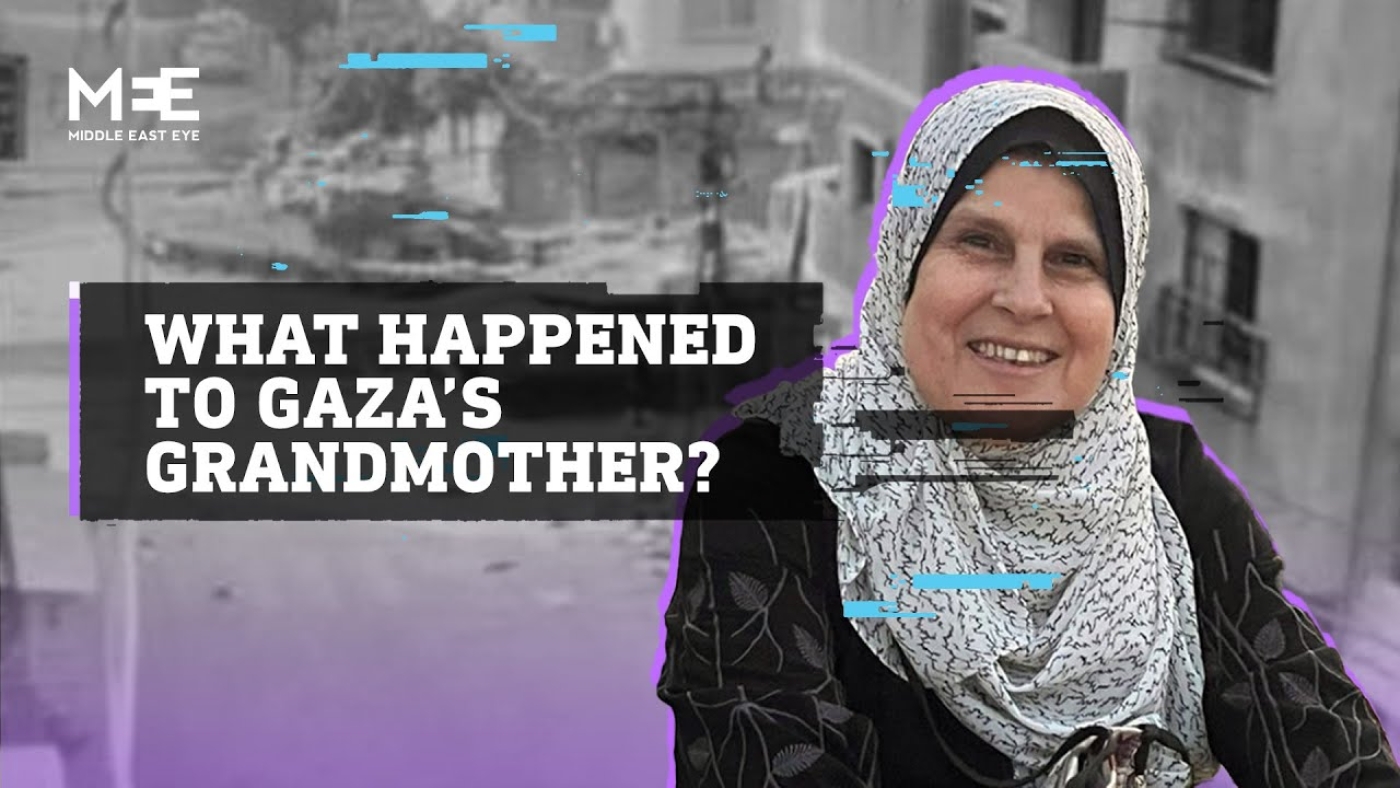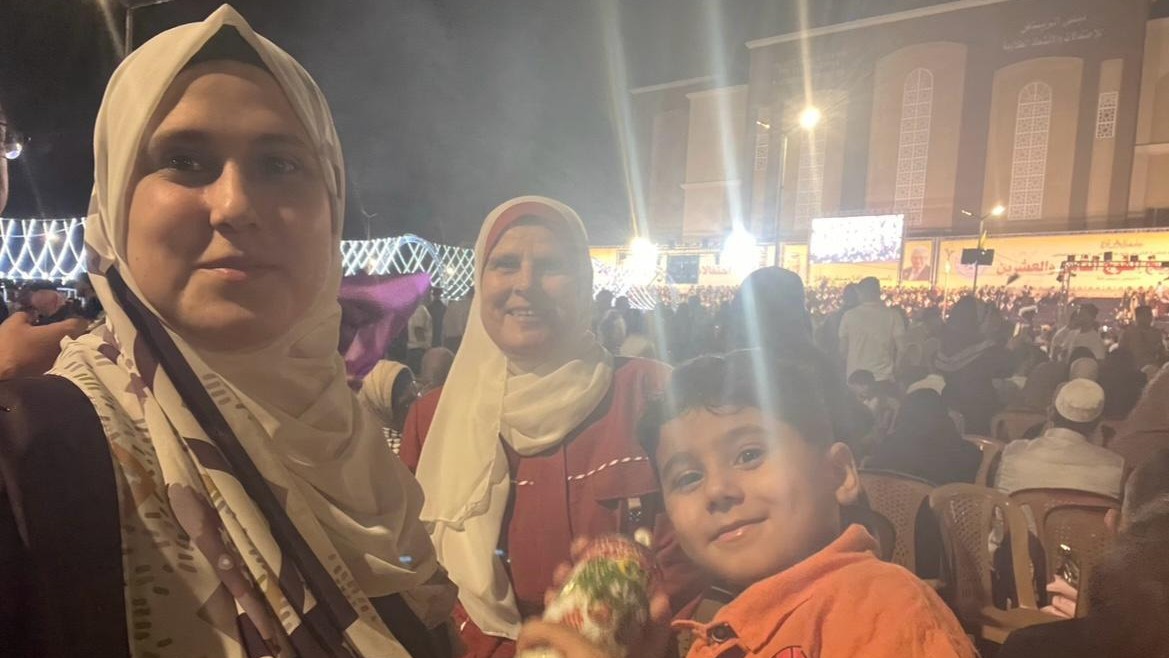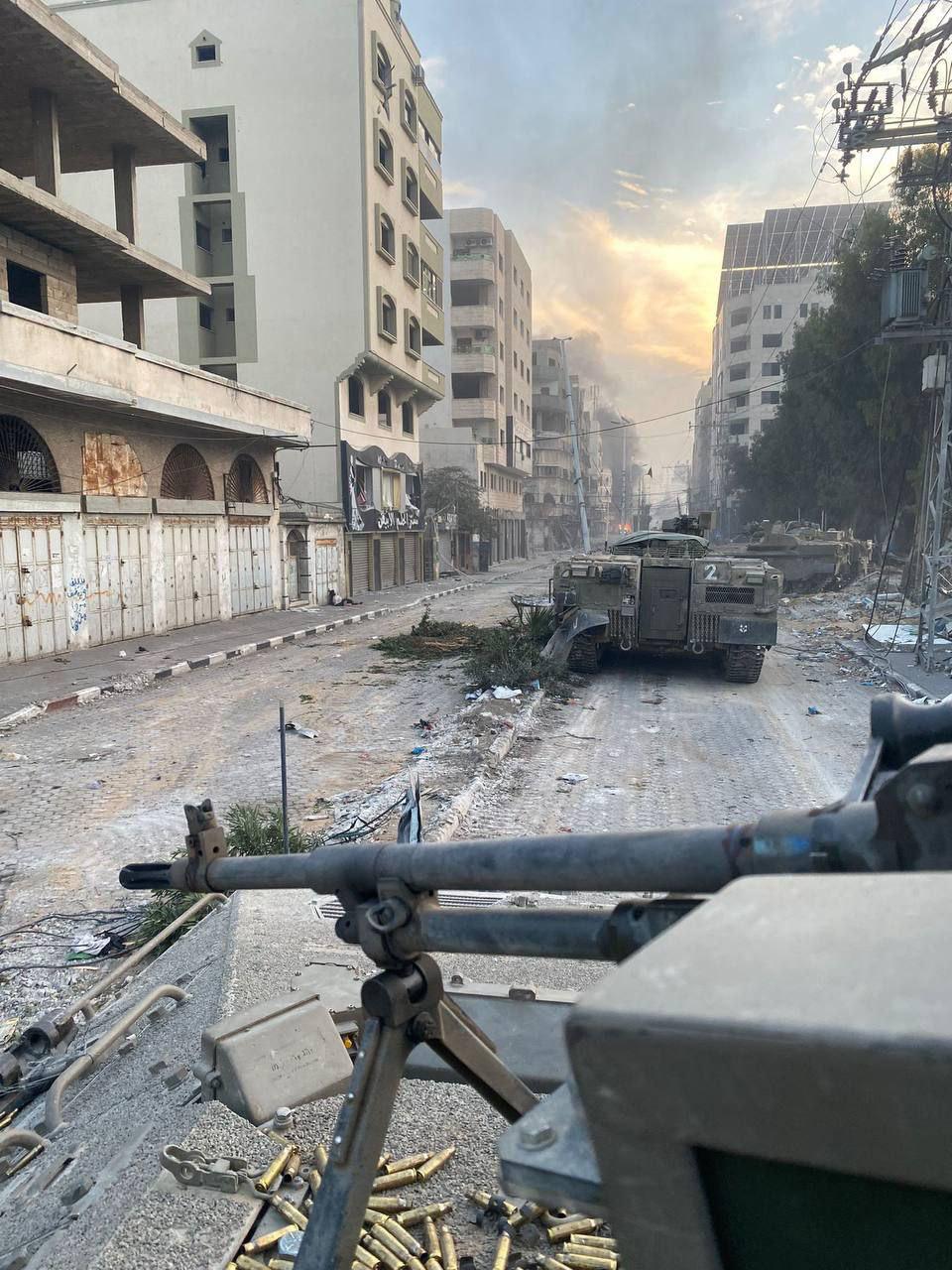Exclusive: Gaza grandmother shot and killed by Israeli sniper as child waved white flag
An Israeli sniper shot dead a Palestinian woman whose grandson was holding a white flag as they attempted to flee from Gaza City to a "safe zone" in the south of the embattled territory, Middle East Eye can reveal.
Hala Rashid Abd al-Ati was walking with several other Palestinians as they attempted to flee the al-Rimal neighbourhood of Gaza City on 12 November. Her hands were interlocked with her grandson who was waving the white flag, exclusive footage of the killing obtained by MEE purports to show.
According to the video, as Abd al-Ati passed through a thoroughfare connected with al-Wihda Street, she was shot dead by a single bullet fired by an Israeli soldier.
The person recording the footage from a nearby building, who MEE will not name for security reasons, can be heard saying: "The woman got shot. The bastards [Israeli troops] shot the woman."
In the footage, a Palestinian man from the group can then be seen running towards Abd al-Ati to check on her well-being as her five-year-old grandson, Taim, runs to passersby for safety.
Stay informed with MEE's newsletters
Sign up to get the latest alerts, insights and analysis, starting with Turkey Unpacked
According to the family, the bullet was fired from an area where the Israeli army was located.
Abd al-Ati's surviving family members, who are now scattered across the Gaza Strip, told MEE that the decision to take that route out of Gaza City came after they had liaised on multiple occasions with the Red Cross.
'My mother was holding her grandson, who dropped to the floor when she was killed'
- Sarah Bassem Khres, daughter
Following the attack by Hamas on southern Israel on 7 October, the Red Cross, along with several other regional countries and the United States, began working with Israel to create "safe zones" which allowed Palestinians to move from northern Gaza to the southern part of the enclave.
MEE has previously reported on Israeli air strikes and sniper fire killing scores of civilians who reluctantly took "safe zones" to reach southern Gaza after being instructed to do so by the Israeli army and government.
Sarah Bassem Khres, one of Abd al-Ati's daughters, told MEE that a day before their family fled their home, Israeli forces had besieged their neighbourhood, positioning tanks and snipers in the densely populated residential area.
"We woke up to the sounds of screams and people crying… after two hours of being surrounded by tanks, we called the Red Cross to help us try to evacuate," she told MEE.
"They told us they stopped working in the north of Gaza, and the area that we are in had become a red zone battlefield and that we had to leave the area immediately."
Khres said the family began to lose hope as the tanks closed in but decided to call the Red Cross again. She said she was told that the situation was becoming increasingly dangerous and they needed to leave.
'I saw her fall to the ground'
According to Khres, on the morning of the killing, the family woke up and prayed together as the sound of Israeli bombs pounding their neighbourhood intensified.
Abd al-Ati then made them breakfast while they sat and read the Quran before preparing to leave.
Khres said they only agreed to venture out when their neighbours could be heard shouting and urging other residents to leave, which they said was done following instructions from the Red Cross.
"At around 11am there was the sound of snipers and bombs, and our neighbours were shouting 'leave, leave,' so we picked up our things, held the white flags and left, while warplanes circled above our heads and live ammunition was being fired at us randomly," she said.
According to Khres, the family then left their home towards al-Shaheed Abdel Qader al-Husain Street in the direction of Omar Bin Abdul Aziz Street.
Khres said they were joined by at least 100 other people, most of whom were women and children.
According to Khres, as soon as they walked out into the middle of the road, she saw her mother fall to the ground as the sound of gunfire rang out.
"My mother was holding her grandson (my sister's son) who dropped to the floor when she was killed," she said.
"I screamed for my mother… it felt like we were tasting death a thousand times every minute."
Grandmother carried bread, olive oil in case of hunger
Khres's sister Heba, a 28-year-old mother of two, told MEE that their family was repeatedly told by other local residents that they would be leaving together as it would likely be safer.
"The instructions we were given were based on information from the Red Cross. We were told there would be a safe corridor to the south of Gaza. My mother was carrying my son Taim," she said.
"I was at the exit of our home waiting for my husband when I heard the sound of live fire and the screams of my sister and cousin. They kept shouting 'go back and go back,' then I saw my mother's lifeless body.
"My brother Mohammed, who is 22, risked his life to go and pick up my mother's body from the street and bring her back home."
Heba said that when her mother was killed, she was carrying bags of bread and olive oil with her because she was unsure of how long they would be away from home and if they would receive food and other basic provisions.
According to Heba, the killing has since separated her and her husband Yousef from their son Taim, adding further unmeasurable pain and agony to their suffering.
"I was gathering stuff in our home and getting ready to leave when I heard the screams outside," Yousef told MEE.
"I didn't think it was our family… I went out to look for Taim and saw a tank very close to us. When I went back home my mother-in-law was dead inside and Taim was missing."
Following the killing, Taim was taken to Nuseirat by a neighbour and then to Rafah in southern Gaza, where he is with his aunt. It is unclear if and when his parents will see him again.
Heba and Sarah's cousin, Malak Anwar al-Khatib, 18, also told MEE of the moment Abd al-Ati was shot dead.
"After she was killed, my aunt was taken inside her home and we tried to nurse her but she was already dead.
"We prayed over her body and buried her near the home… after that, we were told the Red Cross would help us leave again but we lost trust and were not prepared to risk any more of our family."
The Israeli army has not responded to questions about the killing. A photo published by the military on the same day of the incident shows army tanks and snipers stationed on al-Nasr Street, a road parallel to Abd al-Ati's home.
The photo also appears to show the army being present in the area of the intersection from where the bullet was fired.
In a statement, the Red Cross told MEE that "given how dangerous and unsafe the situation was and continues to be, it's not within the ICRC’s role to give instructions on evacuation, as we would not be able to guarantee their safety.
"According to international humanitarian law, it is the responsibility of the warring parties to ensure safe passage to civilians irrespective of the arrangements for evacuations, safe zones, or humanitarian pauses. Even if people choose to stay, they remain protected."
The family have told MEE that they buried Abd al-Ati close to their home, something they say they are grateful for: several decomposing bodies litter the streets, which are often being trampled by Israeli tanks and military vehicles or eaten by stray dogs.
Middle East Eye delivers independent and unrivalled coverage and analysis of the Middle East, North Africa and beyond. To learn more about republishing this content and the associated fees, please fill out this form. More about MEE can be found here.







